-- Over the past four decades and more, China has experienced a 25-fold plus increase in its per capita income, lifted 850 million people out of poverty, and contributed more than 70 percent to the global poverty alleviation effort;
-- From satellite TV services in rural communities of African countries to Uruguay's e-commerce startups to the "China grass" in Papua New Guinea, China has lent a helping hand to other countries in need to achieve economic growth;
-- Calling China's unprecedented poverty alleviation track record one of its "most appealing narratives," Cavince Adhere, a Kenyan international relations researcher, said China's experience has offered concrete solutions to poverty eradication worldwide.
BEIJING, Oct. 16 (Xinhua) -- Srey Chantha, a 35-year-old single mother of three children, is full of hope for a better life after having received support from the China-backed poverty reduction pilot project in Cambodia.
Living in Svay Ampea village of Muk Kampol district's Svay Ampea commune, about 46 km north of capital Phnom Penh, Chantha, a former construction worker, said the project had provided her with daily necessities and a new source of income.
Through the project, a group of Chinese poverty reduction experts, in collaboration with local authorities, had renovated her 5-meter-by-7-meter stilt house and connected it with electricity and clean water, and constructed a toilet for her.
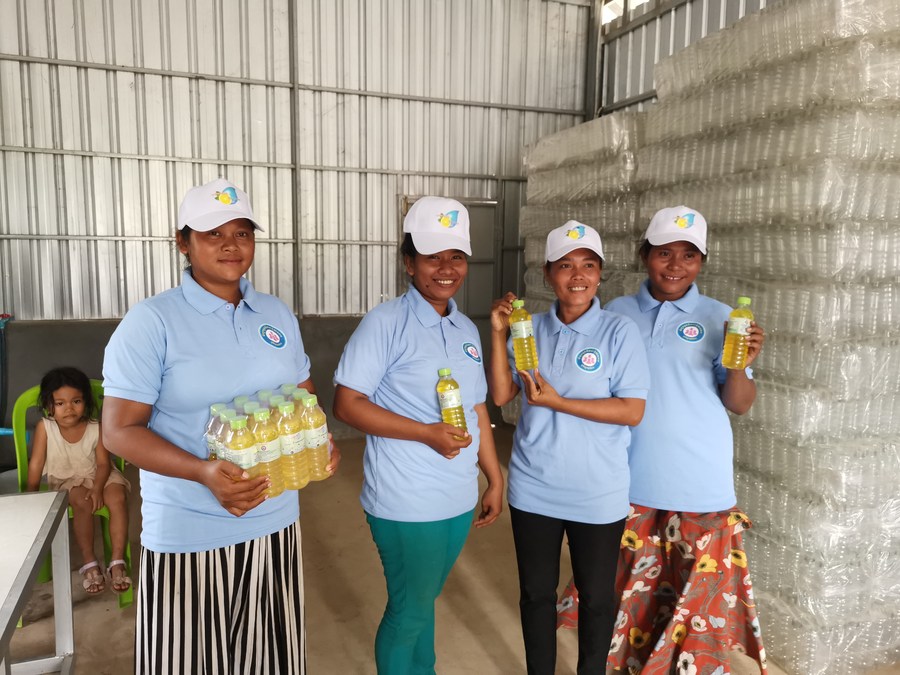
Villagers show detergent products at a factory of a China-aided cooperation project for poverty alleviation in Kandal province of Cambodia, July 31, 2020. (Xinhua)
They had also built a mushroom shed for her and taught her techniques to grow mushrooms and potted vegetables in addition to providing her a cow.
"Thanks to the support from the Chinese project, I can earn my living at home, instead of taking the trouble to go to Phnom Penh for a job anymore, and have enough time with my kids," Chantha told Xinhua at her home.
Chantha said that now she can earn 50,000 riels (11.25 U.S. dollars) to 70,000 riels (17.5 dollars) a day from selling mushrooms and vegetables.
Chantha is one of the 800 families who have benefited from the three-year project carried out by China's Project Center of Sichuan Poverty Alleviation and Development Bureau and Cambodia's Ministry of Rural Development. The project has been underway in two villages -- Svay Ampea and Chheuteal Phlos -- since 2017.
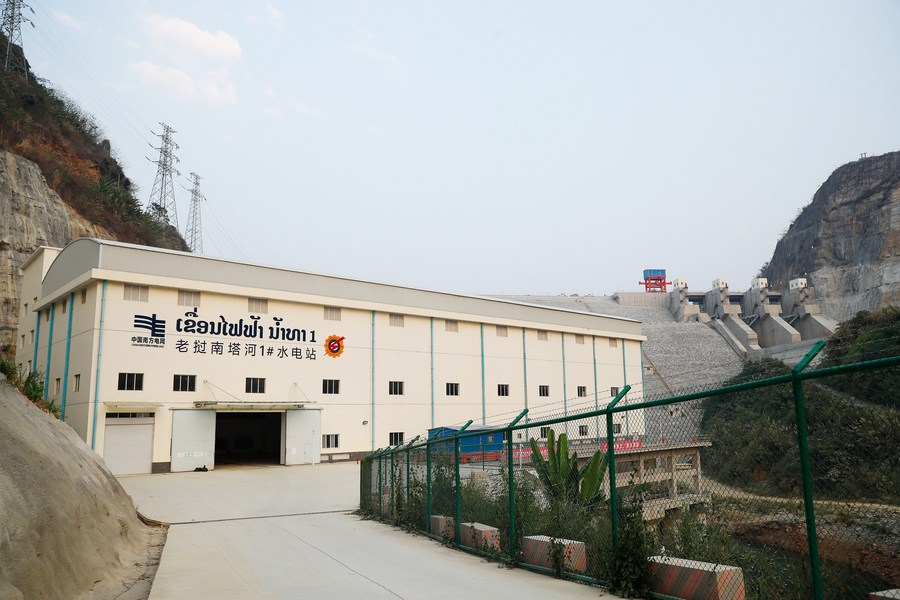
Photo taken on March 19, 2019 shows the Chinese-built Nam Tha 1 Hydropower Plant in Bokeo province in northern Laos. To build the reservoir of the plant, China Southern Power Grid in 2018 has completed the construction of 11 relocation sites to have the migrants settled down, aiming to bring green development and prosperity to the area. (Xinhua/Wang Jingqiang)
"This project has provided them (local residents) new jobs with sustainable sources of income ... Also, it has helped reduce migration for jobs in the city," said Svay Ampea commune chief Chuon Srey Pov.
Yuan Gang, leader of the Chinese expert team for the project, said China's successful experience in poverty reduction has been introduced through this project, adding that it is a smart move to provide the poor with specific occupations rather than cash relief because the latter can only help for a short period.
"It's better to teach a man to fish rather than give him the fish," he said.
Chantha is one of the numerous beneficiaries across the world from China's experience in combatting poverty.
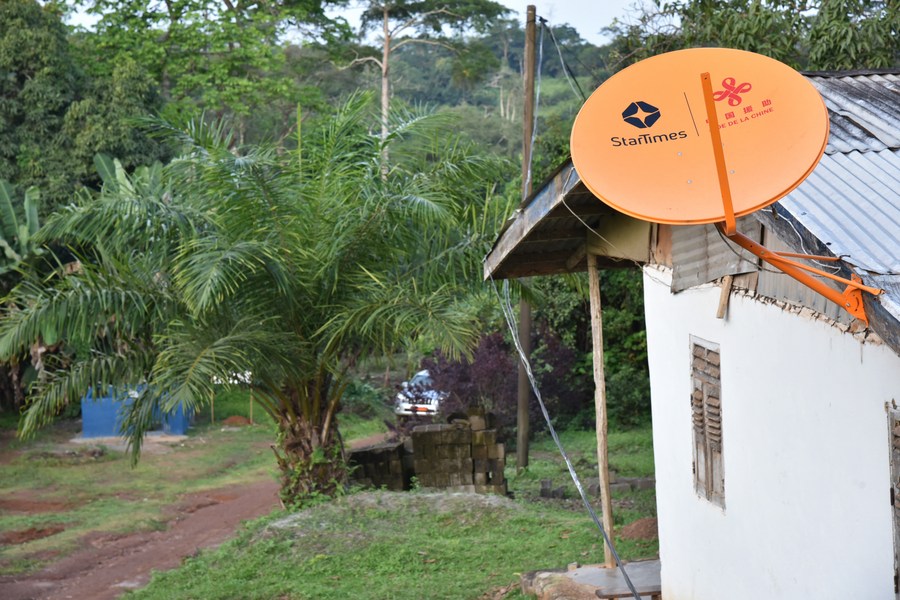
The receiver of satellite television is seen on the house of a family in Abembe II Village, Cameroon, Nov. 14, 2019. (Photo by Jean Pierre Kepseu/Xinhua)
HELPING HAND
Over the past four decades and more, China has experienced a 25-fold plus increase in its per capita income, lifted 850 million people out of poverty, and contributed more than 70 percent to the global poverty alleviation effort, according to official data.
From satellite TV services in rural communities of African countries to Uruguay's e-commerce startups to the "China grass" in Papua New Guinea (PNG), China has lent a helping hand to other countries in need to achieve economic growth.
"Beijing has extended finances, technology and personnel to help other societies to jumpstart economic activities in broad sectors," said Cavince Adhere, a Kenyan international relations researcher with a focus on China-Africa relations.
At the Johannesburg Summit of the Forum on China-Africa Cooperation (FOCAC) in 2015, the Chinese government pledged to provide satellite televisions for 10,000 African villages.
By 2019 Chinese pay-TV company StarTimes had completed a China-aided satellite TV project for 1,000 villages in Nigeria, 800 villages in Kenya and 300 villages in Cameroon.
Nigerian parliament member Odebunmi Dokun said the project's completion was a very unique way of solidifying diplomatic relations between China and Nigeria.
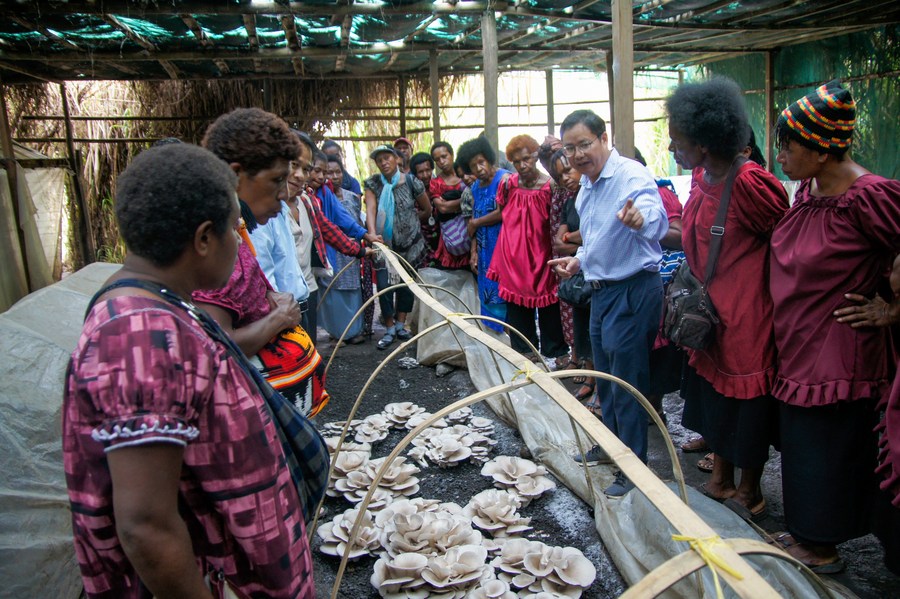
Lin Yingxing (C), specialist from the Fujian Agriculture and Forestry University, introduces "Juncao", a type of special grass that could be used to cultivate edible and medicinal mushrooms and feed livestock, to local residents in the Eastern Highlands Province of Papua New Guinea, on Dec. 19, 2019. (Photo by Hu Yingping/Xinhua)
"The completion of the project ... is an investment to the people because it concerns the masses and enables them to connect to the digital world. The people of Nigeria are sincerely appreciative and will continue to be grateful to China," Dokun said.
Uruguay's e-commerce site Latin American Style, entered the Chinese market with WeChat, the multipurpose app that has over 1.15 billion users, but its idea is to eventually expand to China's e-commerce giants.
The site, which went online on June 21, offers Chinese consumers access to products of small Latin American companies.
"Right now, we are one of the first Uruguayan enterprises in China. In e-commerce, we are the only one," said Martin Perez, a partner of Latin American Style.
In PNG, an estimated 40 percent of its population are living on less than 1.25 dollars daily, "Juncao" and dry-land rice programs introduced from China have improved living standards of about 5000 local households.
"Juncao," a type of special grass which could be used to cultivate edible and medicinal mushrooms and feed livestock and which has helped farmers in southeast China's Fujian Province get rid of poverty, is widely called "China grass" by local people to express their gratitude.
According to the Pacific Aid Map by Australia's Lowy Institute, in 2018, China is among the top five aid donors to the Pacific region with a total donation of 241.08 million dollars in 77 projects.
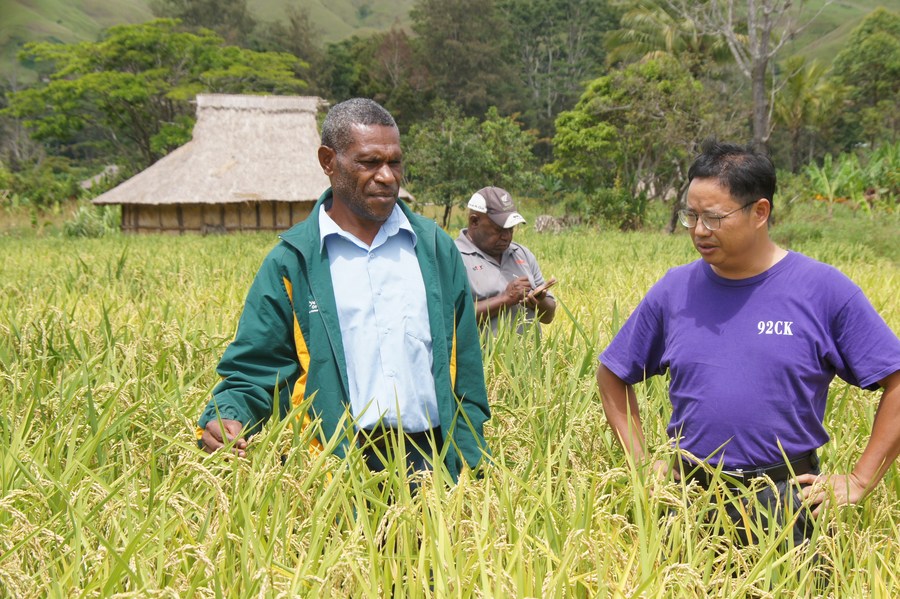
Lin Yingxing (R), specialist from the Fujian Agriculture and Forestry University, checks the growth of the dry-land rice with local specialist Tony Simon in the Eastern Highlands Province of Papua New Guinea, on Jan. 30, 2020. (Photo by Hu Yingping/Xinhua)
POVERTY ALLEVIATION MODEL
China has every confidence to meet 10 years ahead of schedule the poverty eradication target set out in the 2030 Agenda for Sustainable Development and lift out of poverty all rural residents living below the current poverty line within the set time frame, Chinese President Xi Jinping said in September via video link at the general debate of the 75th session of the United Nations General Assembly.
Calling China's unprecedented poverty alleviation track record one of its "most appealing narratives," Adhere, the Kenyan expert, said China's experience has offered concrete solutions to poverty eradication worldwide.
Adhere said China's success in poverty alleviation lies in careful planning, hard work and commitment to the cause, prioritizing the whole society, getting all citizens involved, as well as developing own technologies and philosophies.
China has been continuously helping other nations reduce poverty through the Belt and Road Initiative (BRI), the FOCAC and other platforms.
According to a research report published by the World Bank in October last year, the BRI is expected to lift 7.6 million people out of extreme poverty and 32 million out of moderate poverty across the world.
Noting that the establishment of the FOCAC in 2000 has boosted political and economic cooperation between China and many African countries, Li Xiaoyun, professor at China Agricultural University, said that "the rapid growth of investment and trade has driven agricultural modernization in Africa and greatly helped address the continent's food security and poverty."
"China's experience can inform strategies of development agencies, including the United Nations, to better target and harness resources towards realization of the UN Sustainable Development Goal on poverty," Adhere said.
"Today, the world needs China more than ever before. From small items to big, they are made in China, and cheaper too. It's now a global economic power," Phillip Idro, a former Ugandan diplomat, told Xinhua, adding that developing countries like Uganda can learn from China's experience in the fight against poverty.
Tiong King Sing, president of the Progressive Democratic Party of Malaysia and the Malaysian prime minister's special envoy to China, also praised China's experience and wisdom in alleviating poverty.
"China will become a model for other countries in their respective struggles to reduce poverty," he said.
(Video reporters: Guo Jun, Xie E, Xie Han; Video editor: Wu Yao)■



